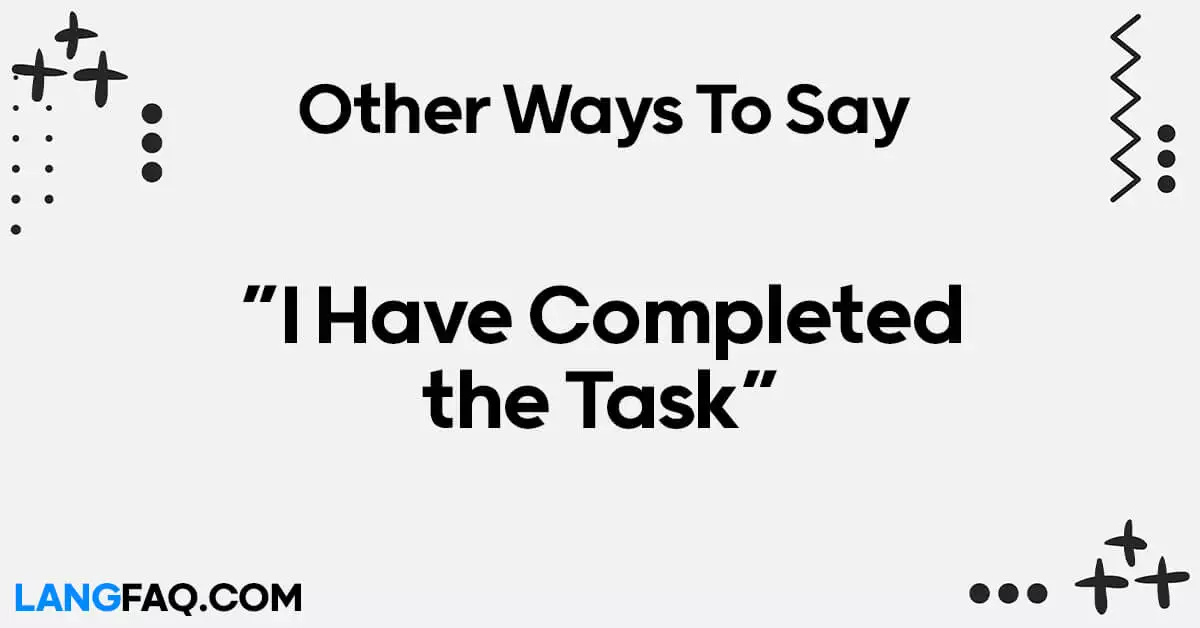In the world of communication, expressing the completion of a task is more than just saying “I have completed the task.” It’s about adding depth and flair to your language.
Whether you’re writing a report, giving a presentation, or simply having a conversation, knowing alternative ways to convey this message can make you sound more sophisticated and engaging.
In this article, we’ll explore 14 other ways to say “I have completed the task” that will not only enhance your vocabulary but also help you express yourself more effectively.
So, let’s dive in and discover these exciting alternatives!
14 Other Ways to Say “I Have Completed the Task”
Let’s explore some creative alternatives to the mundane “I have completed the task.” These expressions can add variety and sophistication to your communication.
- Finished the Job: A straightforward way to convey task completion, suitable for both formal and informal contexts.
- Concluded the Assignment: Ideal for formal situations, such as academic or business settings, where precision is essential.
- Wrapped Up the Task: Adds informality while conveying a sense of accomplishment.
- Accomplished the Mission: Emphasizes the significance of the task or project, especially in goal-oriented contexts.
- Executed the Project: Highlights precision and expertise in planning and completing a task.
- Successfully Carried Out the Duty: Shows responsibility and dedication in fulfilling a duty.
- Brought the Project to a Close: Emphasizes closure and completeness, suitable for formal and creative contexts.
- Achieved the Goal: Underscores success in reaching a specific objective or goal.
- Finalized the Work: Conveys thoroughness and readiness for review, ideal for complex or detailed tasks.
- Wrapped Up the Assignment: Adds a sense of completeness and readiness for submission or review.
- Concluded the Project: Indicates the end of a defined project or endeavor.
- Closed the Chapter: Adds a poetic touch, suitable for tasks marking the end of a phase or period.
- Polished Off the Task: Implies adding the finishing touches and suggests refinement.
- Terminated the Task: Conveys finality and the end of a task with no loose ends, suitable for specific contexts.
These alternatives can help you diversify your language and express task completion more effectively in various situations.
Exploring Alternative Ways to Say “I Have Completed the Task”
In the world of effective communication, mastering various ways to express the completion of a task can significantly elevate your language skills. Whether you’re a student submitting an assignment, a professional delivering a report, or even just engaging in everyday conversations, knowing diverse alternatives to the ubiquitous “I have completed the task” can make you a more dynamic and engaging communicator.
In this educational blog post, we will delve into 14 alternative phrases to convey the completion of a task, exploring when and where to use them, related educational rules, exceptions, tips, and more. Let’s expand your vocabulary and refine your communication skills!
“Finished the Job”
When to Use: This phrase is suitable for both formal and informal contexts. Use it when you want to communicate the successful conclusion of a task or project.
Examples:
- In a professional setting: “I have finished the job ahead of schedule, demonstrating my efficiency.”
- In a casual conversation: “I finished the job, so now I can relax for the weekend.”
Educational Tip: When writing or speaking formally, it’s essential to avoid contractions. Instead of saying, “I’ve finished the job,” use the full “I have finished the job.”
“Concluded the Assignment”
When to Use: This phrase is ideal for formal situations, such as academic or business contexts, where precision and formality are essential.
Examples:
- In an academic paper: “The study concluded the assignment by summarizing its key findings.”
- In a business report: “We concluded the assignment on time, meeting the client’s expectations.”
Educational Rule: When using formal language, remember to maintain consistency in tone and style throughout your writing or speech.
“Wrapped Up the Task”
When to Use: Employ this phrase when you want to add a touch of informality to your language. It conveys a sense of completion and accomplishment.
Examples:
- In an email to a colleague: “I’ve wrapped up the task we discussed earlier. It’s all set for review.”
- In a conversation with friends: “I finally wrapped up the task, and now I can enjoy my evening.”
Educational Insight: Adding a metaphorical element like “wrapped up” can make your language more engaging and memorable.
“Accomplished the Mission”
When to Use: Use this phrase when you want to emphasize the significance of a task or project, particularly in a professional or goal-oriented context.
Examples:
- In a project presentation: “Our team successfully accomplished the mission by exceeding our targets.”
- In a military context: “The troops accomplished the mission with great courage and precision.”
Educational Exception: While “mission” typically relates to tasks with a specific objective, using it metaphorically can add depth to your communication.
“Executed the Project”
When to Use: Reserve this phrase for tasks that involve careful planning and execution. It emphasizes precision and expertise.
Examples:
- In a project management report: “We executed the project flawlessly, thanks to our meticulous planning.”
- In a discussion about art: “The artist executed the project with incredible attention to detail.”
Educational Tip: “Executed” implies a deliberate and well-thought-out process, so be sure the context aligns with this connotation.
“Successfully Carried Out the Duty”
When to Use: Use this phrase when you want to highlight your sense of responsibility and dedication in completing a task or duty.
Examples:
- In a job interview: “I have consistently and successfully carried out my duties, ensuring smooth operations.”
- In a personal reflection: “I take pride in successfully carrying out my parental duties.”
Educational Note: In formal communication, it’s essential to choose words that convey a strong sense of commitment.
“Brought the Project to a Close”
When to Use: This phrase is particularly useful when you want to emphasize the closure and completeness of a project or task.
Examples:
- In a project summary: “We’ve brought the project to a close, achieving all our milestones.”
- In a novel: “The author skillfully brought the story to a close, leaving readers satisfied.”
Educational Perspective: “Bringing a project to a close” implies a sense of finality and order, making it suitable for formal and creative contexts alike.
“Achieved the Goal”
When to Use: Employ this phrase when you want to underscore your success in reaching a specific objective or goal.
Examples:
- In a business meeting: “Our team achieved the goal of increasing sales by 20% this quarter.”
- In a personal journal: “I’m thrilled to have achieved the goal I set for myself.”
Educational Advice: Clearly defining your goals before using this phrase enhances its impact.
“Finalized the Work”
When to Use: Use “finalized the work” when you’ve completed a complex or detailed task, and you want to convey a sense of thoroughness.
Examples:
- In a design project presentation: “After countless revisions, we’ve finalized the work and are ready for approval.”
- In a legal document: “The lawyers have finalized the work on the contract, ensuring all clauses are in order.”
Educational Note: “Finalized” suggests attention to detail and the resolution of any outstanding issues.
“Wrapped Up the Assignment”
When to Use: Similar to “wrapped up the task,” this phrase adds a sense of completeness and readiness for review.
Examples:
- In a student’s email to a professor: “I’ve wrapped up the assignment and attached it for your review.”
- In a team meeting: “Let’s wrap up the assignment, ensuring all aspects are covered.”
Educational Insight: Using this phrase demonstrates a proactive approach to task completion.
“Concluded the Project”
When to Use: Use this phrase when you want to indicate the end of a defined project or endeavor.
Examples:
- In a project management report: “We successfully concluded the project on time and within budget.”
- In a film review: “The director skillfully concluded the project with a thought-provoking ending.”
Educational Consideration: “Concluded” implies a sense of finality, making it suitable for formal and creative contexts.
“Closed the Chapter”
When to Use: Use this phrase when tasks mark the end of a phase or period, adding a poetic touch to your communication.
Examples:
- In a farewell speech: “As we graduate, we’re closing the chapter on our school years and opening new ones.”
- In a novel analysis: “The author masterfully closed the chapter on one character’s journey, leaving readers eager for more.”
Educational Perspective: Metaphorical language can add depth and emotion to your communication.
“Polished Off the Task”
When to Use: Use this phrase to imply that you’ve added the finishing touches to your work, suggesting refinement.
Examples:
- In a cooking blog: “I’ve polished off the task by garnishing the dish with fresh herbs.”
- In a software development context: “The team polished off the task, making the user interface more user-friendly.”
Educational Note: “Polished off” emphasizes the final, detailed stages of a task, so ensure it aligns with your context.
“Termination of the Task”
When to Use: When you want to convey finality and the end of a task with no loose ends, “termination of the task” is a strong choice.
Examples:
- In a legal context: “The termination of the task is documented in the contract, ensuring clarity on responsibilities.”
- In a software development meeting: “We’re discussing the termination of the task to ensure all requirements are met.”
Educational Consideration: “Termination” has a formal and definitive connotation, making it suitable for specific contexts.
Expanding your vocabulary and using these alternative phrases to say “I have completed the task” can significantly improve your communication skills. Whether you’re a student, a professional, or anyone who values effective communication, these alternatives will help you express yourself more precisely and memorably.
Continue to explore more ways to enrich your language and enhance your communication abilities. Stay tuned for more educational insights and language tips!
Frequently Asked Questions (FAQs)
Here are some common questions about alternative ways to say “I have completed the task”:
Can I use these alternatives in formal writing?
Absolutely! Many of these alternatives are suitable for formal documents and presentations. Choose the one that fits the tone of your writing.
Are these alternatives region-specific?
No, these alternatives can be used in various English-speaking regions. They are widely understood and accepted.
How can I remember these alternatives?
Practice makes perfect. Try using these alternatives in your everyday conversations and writing to reinforce your memory.
Do these alternatives work for both professional and personal communication?
Yes, they can be used in both professional and personal contexts, depending on the formality of the situation.
Are there any alternatives that are more casual?
Certainly! Phrases like “wrapped up the task” and “polished off the task” have a more relaxed tone.
Can I mix and match these alternatives?
Of course! Feel free to use different alternatives in different situations to keep your language fresh and engaging.
Conclusion
Expanding your vocabulary and using alternative expressions to convey the completion of a task can significantly improve your communication skills. Whether you’re in a formal meeting or having a casual conversation, these 14 alternatives will help you express yourself more effectively and make a lasting impression. So, go ahead and incorporate these phrases into your language repertoire. You’ll be amazed at how they can enhance your communication.







